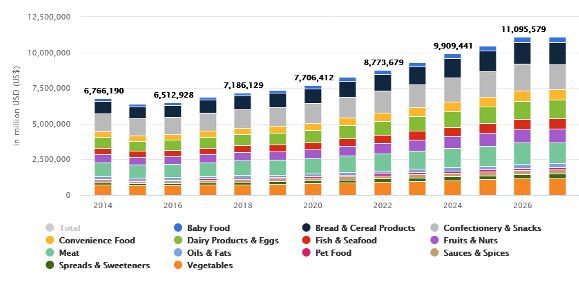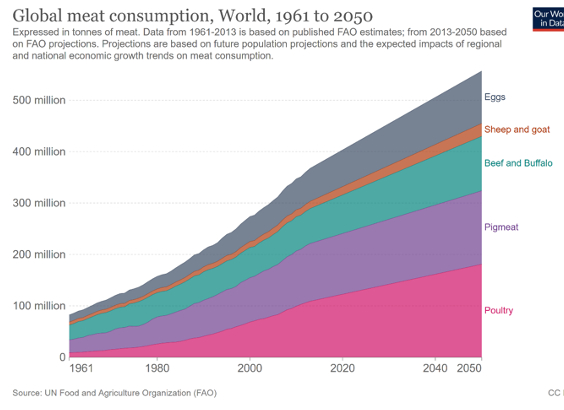The food industry is undergoing significant transformations, with large corporations and start-ups innovating in taste, health benefits, safety, and transparency. People have better understood the quality of the food they consume because of increased access to information and breakthroughs in scientific study, leading to an extensive discussion of innovation in the food industry.
Since the pandemic, the market has seen many emerging trends as people have become more concerned about their health and well-being. And as manufacturers adapt to pandemic-induced behavior, the market outlook for the food sector has turned optimistic, providing an excellent opportunity for both investors and companies to gain exposure to this industry.
Source: Statista
The future of the food market is being driven by food-related technological innovation, and these latest technological advancements are trying to solve both existing and upcoming issues in the industry that could threaten a steady supply of food to people across the world.
Technological innovation improves food health and safety standards and risk management, allowing customers to learn more about the food they consume. Furthermore, one of the industry's emerging challenges is labor shortages. As a result, automation will become an essential part of manufacturers' efforts to improve production efficiency and cost reduction in the near future.
Plant-based alternatives have grown in popularity recently, with veganism becoming a hot topic. The market for plant-based food is predicted to reach $44.2 billion this year as an increasing number of allergic people to animal proteins seek vegan food, and considerable R&D investments are already fueling the growth of this market.
Plant-based diets are followed by about 3% of the population in the United States. The global plant-based meat market is expected to grow at a compounded annual growth rate of 18.3% to $12.32 billion by 2027. The modern healthy food revolution began a long time ago, with the introduction of plant-based milk in the 1910s, as well as the trend for sustainable food choices and plant-based diets.
Organic food sales have also more than doubled since 2000, increasing from less than $20 billion in 2000 to more than $120 billion in 2020. Although plant-based alternatives have gained traction in recent years, policymakers agree that meat products will still account for the lion’s share of people’s diets in the foreseeable future.

As a result, policymakers and environmental organizations are encouraging the development of alternative protein sources and low-impact animal protein production methods. According to a study, three-quarters of deforested land is turned into agricultural land, much of which is used for livestock or to grow crops for their feed. Innovation will reduce the farming industry’s negative impact on the environment.
Cultured meat, also known as cultivated or cell-based meat, eliminates the need to breed, raise, and slaughter animals, reducing the environmental impact of traditional meat production. Compared to traditional meat production, cultured meat produced with renewable energy reduces the impact of global warming. It also substantially lowers the usage of land.
Cultured meat is manufactured utilizing cell culture procedures in a laboratory or manufacturing facility, employing master cells obtained from cattle, chicken, pigs, fish, and lamb and other forms of livestock and seafood. The concept has been in existence since the early 2000s and is expected to gain popularity as an alternative protein source in the coming years.
Markets & Markets estimates that the global cultured meat market will be valued at $214 million in 2025. The cultured meat market is still a nascent industry, but Research & Markets claims that by 2040, 60% of meat consumed globally will be produced from cells grown in bioreactors.
Currently, nearly half of consumers have no reservations about eating cultured meat, which gives reason to believe that cultured meat will be a major disruptor of the conventional meat market over the next 10 to 20 years.
The pandemic has prompted a long-term shift toward healthier and more environmentally friendly products in the food industry. These trends show no signs of slowing, and here are the top four undervalued food stocks that are uniquely positioned to benefit from these trends.
1. Mondelez
Mondelez International (NASDAQ:MDLZ) is a global food company that sells food, beverages, and snacks in over 150 countries. Mondelez’s well-known brands include Cadbury, Toblerone, Oreo, Ritz, and Tang. With its focus on cost reduction, Mondelez's profitability has steadily increased.
In 2021, the company earned $28.72 billion in annual revenue, growing 8% year over year. Mondelez is attempting to increase efficiency, and the corporation has reduced CO2 emissions by 15%, food waste by 20%, and packaging by 65,000 tonnes.
The company claims to be #1 or #2 in all core snacking areas, including biscuits, chocolate, candy, and gum. Despite the strong performance, Mondelez is still undervalued. For fiscal 2022, earnings estimates are $3.1 per share, and the stock is currently trading at an earnings multiple of 20.
2. Ingles Markets
Ingles Markets (NASDAQ:IMKTA) is a supermarket chain with nearly 200 locations in the southern United States. Ingles food products include groceries, meat, dairy products, frozen food, and other perishables. The company also generates revenue from gasoline, dairy operations, and shopping center rentals.
The company's revenue has been steadily increasing, and its cash flows appear to be healthy. In 2021, the company reported revenue of $4.98 billion, with grocery products accounting for 35.3% of the total sales. On the other hand, non-food items accounted for 22.8% of sales, with perishables accounting for 27%. The company's stock appears to be highly undervalued trading at a price-to-earnings multiple of 6.7.
3. MeaTech 3D
Meatech 3D (NASDAQ:MITC) is an Israeli deep-tech food startup developing slaughter-free meat products using advanced 3D bioprinting and tissue engineering technology as an alternative to industrialized animal farming. In 2021, the company reported a net loss of $17.8 million and had cash and equivalents of $19.2 million.
Even more importantly, the company revealed that it had successfully 3D printed a 3.67 oz cultivated steak primarily composed of cultivated real fat and muscle tissue without soy or pea protein. MeaTech has celebrity backing, with Hollywood actor and entrepreneur Ashton Kutcher working with the company to help it become the market leader in cultured meat manufacturing.
Last year, the company wholly acquired Peace of Meat, a leading developer of cultured chicken fat biomass based in Belgium, to diversify its bovine-oriented technologies and accelerate its entry into the market through plant-based meat alternatives. In July 2021, Peace of Meat cultivated slightly more than 700 grams of pure chicken fat biomass in a single production run.
The company recently signed a term sheet to establish a pilot plant and R&D facility in Belgium to scale cultured fat development and accelerate market entry. In the long run, this expansion will be critical in the development and advancement of cultured meat, while in the short run, it will position MeaTech as a possible leader in the hybrid products market.
Last week, the company held a tasting event for its Israeli anchor investors. They tasted hybrid chicken nuggets made with plant protein and cultured chicken fat biomass developed by Peace of Meat.
4. Kroger
The Kroger Company (NYSE:KR) is one of the largest retailers in the United States, with 3,000 supermarkets in more than 30 states. The company is known for its grocery-pharmacy strategy, which enables it to sell both fresh food and medicines.
In Q4, the supermarket behemoth exceeded analyst forecasts in terms of profitability and revenue, with total company sales of $33.0 billion. The company's adjusted earnings per share increased 12% to 91 cents per share, beating Wall Street's forecast of 74 cents.
Kroger forecasted a single-digit gain in same-store sales in fiscal 2022 and raised full-year EPS forecasts after highlighting its continuous digital push and a commitment to long-term shareholder returns of 8% to 11%. Although the competition is intense and the home eating trend is likely to fade, the long-term picture is encouraging with booming digital sales.
Conclusion
The food industry is evolving, creating opportunities for both established giants and newcomers to unlock growth opportunities in every business vertical connected to the global food industry. The companies discussed in this analysis seem well-positioned to benefit from the changing industry dynamics.
